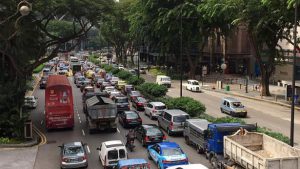Traffic in Singapore
June 9, 2015

Since 1975, Singapore has introduced a relentless series of traditional and experimental measures to slow down the growth of the motor vehicle population and to control its usage. In their paper, “Curbing Urban Traffic Congestion in Singapore: A Comprehensive Review”, Dr. Rex S. Toh and Dr. Phang Sock-Yong (Alumnus, Dept. of Economics) wrote that although these road transport policies are effective in Singapore, policies such as ERP may not be the ultimate solution for traffic congestion in other countries.
Abstract:
One of the most pervasive and frustrating of modern transportation problems is urban traffic congestion. Since 1975, Singapore has introduced a relentless series of traditional and experimental measures to slow down the growth of the motor vehicle population and to control its usage. While some of the measures have been somewhat successful, some of the problems were shifted or were substituted. The Area Licensing Scheme led to a shifting of the problem in time and place while the quota system has substituted uncertainty in quantity with uncertainty in price. Furthermore, the Preferential Additional Registration Fee system and the Quota System had the unintentional effect of creating an appreciating asset market for motor vehicles encouraging speculation, while the well intentioned Weekend Car Scheme resulted in some undesirable redistributional effects.
To learn more about this article, click here:
http://www.jstor.org.libproxy1.nus.edu.sg/stable/20713342?seq=9#page_scan_tab_contents
